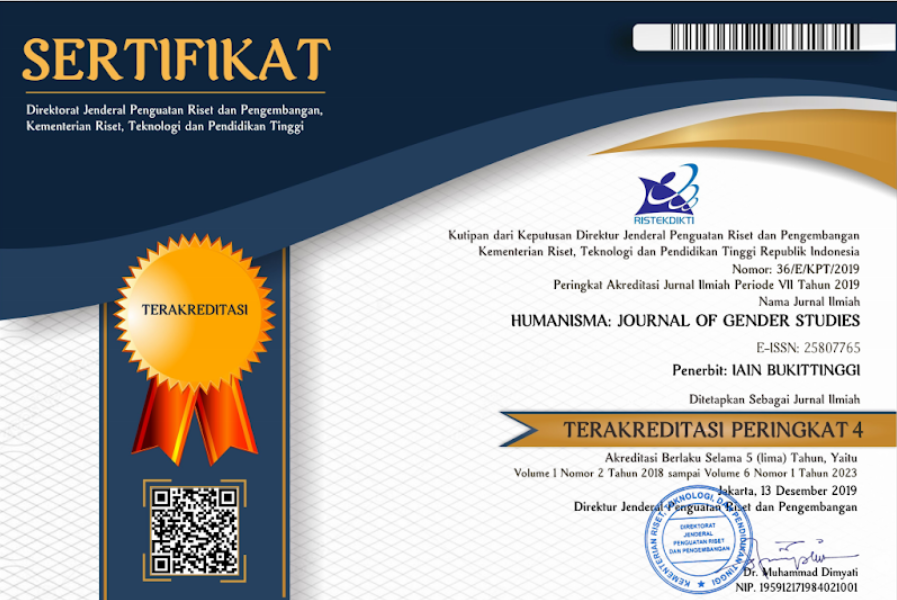Pathways to the Studies on Men and Masculinities in Bangladesh
DOI:
https://doi.org/10.30983/humanisme.v6i2.5573Keywords:
Bangladesh, Masculinity, Men, Review,Abstract
In any society, the analysis of gender must include ‘men and masculinities’. But ‘men and masculinities’ as research attention is relatively underdeveloped in Bangladesh. This article provides an overview of the current studies on ‘men and masculinities’ in Bangladesh. Using Pub Med and Google Scholar databases, 37 closely relevant full-text documents were reviewed. This review uncovers that the ideal/hegemonic version of Bangladeshi masculinity is predominantly constructed/epitomized, amongst others, as being the provider, powerful, physically strong, good sexual performer, and having the ability to control wife. Across studies, the discourses, narratives, and practices of various masculinities in Bangladesh are expressed in the context of religion, migration, sexuality, fatherhood, suicide, violence, women empowerment, sports, and marginality. In some cases, the ideal/hegemonic version of Bangladeshi masculinity encounters serious tensions, ambiguities, resistances, and contestations. Alternative masculine discourses and narratives which reject and resist hegemonic masculine ideals and practices were also noted. This review ends with a call for a future research direction.
References
Ahmed, Fauzia Erfan. “Microcredit, Men, and Masculinity.†NWSA Journal 20, no. 2 (2008): 122–55. http://www.jstor.org/stable/40071279
Anwary, Afroza. “Construction of Hegemonic Masculinity: Violence against Wives in Bangladesh.†Women's Studies International Forum 50 (2015): 37–46. https://doi.org/10.1016/j.wsif.2015.02.011.
An, Thanh Ly, Andrea Waling, and Adam Bourne. “Men and Masculinities Studies in Vietnam: A Brief Review.†Sociology Compass 16, no. 3 (2022). https://doi.org/10.1111/soc4.12965.
Ball, Jessica, and Muhammad Obaidullah Wahedi. “Exploring Fatherhood in Bangladesh.†Childhood Education 86, no. 6 (2010): 366–70. https://doi.org/10.1080/00094056.2010.10523171.
Chakraborty, Chandrima. “Mapping South Asian Masculinities: Men and Political Crises.†South Asian History and Culture 5, no. 4 (2014): 411–20. https://doi.org/10.1080/19472498.2014.936211.
Choudhury, Tanzina, and Suzanne Clisby. “Masculinity in Transition or Patriarchy Reasserted? A Study of Construction Workers in Sylhet, Bangladesh.†Studies on Home and Community Science 11, no. 2 (2018): 125–39. https://doi.org/10.1080/09737189.2017.1420406.
Chowdhury, Elora Halim. “Rethinking Patriarchy, Culture and Masculinity: Transnational Narratives of Gender Violence and Human Rights Advocacy.†Hawwa 12, no. 1 (2014): 79–100. https://doi.org/10.1163/15692086-12341253.
Connell, Raewyn. “The Study of Masculinities.†Qualitative Research Journal 14, no. 1 (2014): 5–15. https://doi.org/10.1108/qrj-03-2014-0006.
Connell, Raewyn, and James W. Messerschmidt. “Hegemonic Masculinity: Rethinking the Concept.†Gender & Society 19, no. 6 (December 2005): 829–59. https://doi.org/10.1177/0891243205278639.
Cserni, Robert T., and Lee W. Essig. “Twenty Years of Men and Masculinities by the Numbers: An Analysis of Publications and Article Keywords.†Men and Masculinities 22, no. 1 (2019): 5–15. https://doi.org/10.1177/1097184x18805349.
Demetriou, Demetrakis Z. “Connell’s Concept of Hegemonic Masculinity: A Critique,†Theor Soc 30, (2001): 337–361. https://doi.org/10.1023/A:1017596718715
Everitt-Penhale, Brittany, and Kopano Ratele. “Rethinking ‘Traditional Masculinity’ as Constructed, Multiple, and ≠Hegemonic Masculinity.†South African Review of Sociology 46, no. 2 (2015): 4–22. https://doi.org/10.1080/21528586.2015.1025826.
Gopinath, Praseeda, and Pavitra Sundar. “Introduction: Masculinities.†South Asian Popular Culture 18, no. 1 (2020): 1–10. https://doi.org/10.1080/14746689.2020.1736819.
Haque, Md. Mozammel, and Kyoko Kusakabe. “Retrenched Men Workers in Bangladesh: A Crisis of Masculinities?†Gender, Technology and Development 9, no. 2 (2005): 185–208. https://doi.org/10.1177/097185240500900202.
Hasan, Kamrul. “Researching Masculinity and Men’s Sexual Health in Bangladesh: Methodological Reflections.†Qualitative Sociology Review 17, no. 4 (2021): 44–57. https://doi.org/10.18778/1733-8077.17.4.03.
Hasan, Kamrul, and Peter Aggleton. “Rethinking Gender and Health.†International Journal of Men’s Social and Community Health 3, no. 1 (2020). https://doi.org/10.22374/ijmsch.v3i1.25.
Hasan, Md. Kamrul, Peter Aggleton, and Asha Persson. “The Makings of a Man: Social Generational Masculinities in Bangladesh.†Journal of Gender Studies 27, no. 3 (2017): 347–61. https://doi.org/10.1080/09589236.2017.1388773.
Hearn, Jeff. “From Hegemonic Masculinity to the Hegemony of Men.†Feminist Theory 5, no. 1 (2004): 49–72. https://doi.org/10.1177/1464700104040813.
Hearn, Jeff. “So What Has Been, Is, and Might Be Going on in Studying Men and Masculinities?: Some Continuities and Discontinuities.†Men and Masculinities 22, no. 1 (2019): 53–63. https://doi.org/10.1177/1097184x18805550.
Hearn, Jeff, and Robert Morrell. “Reviewing Hegemonic Masculinities and Men in Sweden and South Africa.†Men and Masculinities 15, no. 1 (2012): 3–10. https://doi.org/10.1177/1097184x11432111.
Hossain, Adnan. “Sexual Nationalism, Masculinity and the Cultural Politics of Cricket in Bangladesh.†South Asia: Journal of South Asian Studies 42, no. 4 (2019): 638–53. https://doi.org/10.1080/00856401.2019.1607153.
Kabir, Humayun, “Hegemonic Masculinity and Contraceptive Use among the Males of Bangladesh: A Study on Dhaka City,†Social Science Review 32, no. 2 (2015) 55-66.
Karim, Rabiul, Lene Lindberg, Sarah Wamala, and Maria Emmelin. “Men’s Perceptions of Women’s Participation in Development Initiatives in Rural Bangladesh.†American Journal of Men's Health 12, no. 2 (2017): 398–410. https://doi.org/10.1177/1557988317735394.
Khan, Anisur Rahman. “Hegemonic Masculinity in the Marginal Societal Context,†AGATHOS 12 no 1 (2021): 223-234.
Khan, Anisur Rahman, Isaac Dery, and Rebecca Helman. “Masculinity and Men’s Suicide Attempts in Bangladesh.†Journal of Loss and Trauma 27, no. 4 (2021): 367–85. https://doi.org/10.1080/15325024.2021.1987037.
Khan, Anisur Rahman, and Najuwa Arendse. “Female Perpetrated Domestic Violence against Men and the Case for Bangladesh.†Journal of Human Behavior in the Social Environment 32, no. 4 (2021): 519–33. https://doi.org/10.1080/10911359.2021.1927281.
Khan, Anisur Rahman, Najuwa Arendse, and Kopano Ratele. “Intimate Relationships and Suicidal Behaviour of Men in Bangladesh.†Mortality, 2021, 1–20. https://doi.org/10.1080/13576275.2021.1879755.
Khan, Anisur Rahman, Kopano Ratele, and Najuwa Arendse. “Men’s Reflections on Postsuicide Attempt Episode in Bangladesh.†OMEGA - Journal of Death and Dying 84, no. 2 (2020): 582–95. https://doi.org/10.1177/0030222820904878.
Khan, Anisur Rahman, Kopano Ratele, Isaac Dery, and Shahriar Khandaker. “Men and Climate Change: Some Thoughts on South Africa and Bangladesh.†NORMA, 2022, 1–17. https://doi.org/10.1080/18902138.2022.2077082.
Khan, Anisur Rahman, Kopano Ratele, Rebecca Helman, Sipho Dlamini, and Refiloe Makama. “Masculinity and Suicide in Bangladesh.†OMEGA - Journal of Death and Dying, 2020, 003022282096623. https://doi.org/10.1177/0030222820966239.
Khan, Sharful Islam, Nancy Hudson-Rodd, Sherry Saggers, Mahbubul Islam Bhuiyan, Abbas Bhuiya, Syed Afzalul Karim, and Oratai Rauyajin. “Phallus, Performance and Power: Crisis of Masculinity.†Sexual and Relationship Therapy 23, no. 1 (2008): 37–49. https://doi.org/10.1080/14681990701790635.
Morrell, Robert. “Vehicle for Southern African Knowledge? Men and Masculinities and Research from South Africa.†Men and Masculinities 22, no. 1 (2019): 34–43. https://doi.org/10.1177/1097184x18805548.
Munshi, Naadria. “Lived Experiences and Local Spaces: Bangladeshi Migrants in Post-Apartheid South Africa.†New Contree 67, Special Edition (2013): 119-137.
Pande, Amrita. “Mobile Masculinities: Migrant Bangladeshi Men in South Africa.†Gender & Society 31, no. 3 (2017): 383–406. https://doi.org/10.1177/0891243217702825.
Ratele, Kopano. “Currents against Gender Transformation of South African Men: Relocating Marginality to the Centre of Research and Theory of Masculinities.†NORMA 9, no. 1 (2014): 30–44. https://doi.org/10.1080/18902138.2014.892285.
Samuel, Geoffrey. “Islamic Piety and Masculinity.†Contemporary Islam 5, no. 3 (2011): 309–22. https://doi.org/10.1007/s11562-011-0163-x.
Schuler, Sidney Ruth, Rachel Lenzi, Shamsul Huda Badal, and Sohela Nazneen. “Men’s Perspectives on Women’s Empowerment and Intimate Partner Violence in Rural Bangladesh.†Culture, Health & Sexuality 20, no. 1 (2017): 113–27. https://doi.org/10.1080/13691058.2017.1332391.
Sowad, Abu Saleh Mohammad. 2017. “Influences of Emerging Beauty Industry for Men on Construction of Masculinities of Male Students of Dhaka City.†Masculinities & Social Change 6 (1):1-16. https://doi.org/10.17583/mcs.2017.2290.
Waling, Andrea. “Rethinking Masculinity Studies: Feminism, Masculinity, and Poststructural Accounts of Agency and Emotional Reflexivity.†The Journal of Men’s Studies 27, no. 1 (2018): 89–107. https://doi.org/10.1177/1060826518782980.
Wedgwood, Nikki. “Connell's Theory of Masculinity – Its Origins and Influences on the Study of Gender1.†Journal of Gender Studies 18, no. 4 (2009): 329–39. https://doi.org/10.1080/09589230903260001.
Ye, Junjia. “Migrant Masculinities: Bangladeshi Men in Singapore’s Labour Force.†Gender, Place and Culture 21, no. 8 (2013): 1012–28. https://doi.org/10.1080/0966369x.2013.817966.
Book/Book Chapter
Chowdhury, Debdatta. “Masculinity at Work, Masculinity at Stake: Male Negotiations along the West Bengal-Bangladesh Border.†In Popular Masculine Cultures in India: Critical Essays, edited by Rohit K. Dasgupta, and Steven Baker, 26-44. Delhi: Setu Prakashani, 2012.
Connell, Raewyn. Masculinities. Berkeley: University of California Press, 1995.
Hearn, Jeff. “Methods and Methodologies in Critical Studies on Men and Masculinities.†In Men, Masculinities and Methodologies, edited by Barbara Pini and Bob Pease, 26-38. London: Palgrave Macmillan, 2013.
Howson, Robert. Challenging Hegemonic Masculinity. London: Routledge, 2006.
Kamal, Shashish Shami. “Masculinity and violence against women: Exploring the practices of young men in Bangladesh.†In Global Masculinities: Interrogations and Reconstructions, edited by Mangesh Kulkarni, and Rimjhim Jain, 65-81, New York: Routledge, 2019.
Khan, M.E. and Aditi, Aeron. “Sexual Worries and Risk-Taking Behaviors of Men in the Urban Slums of Bangladesh,†In Sexuality, Gender Roles, and Domestic Violence in South Asia, edited by M.E. Khan, John W. Townsend, and Perrti J. Pelto, 155-174. New York: Population Council, 2014.
Khan, M.E. and John W. Townsend. “Representation of the Masculine identity in Bangladesh.†In Sexuality, Gender Roles, and Domestic Violence in South Asia, edited by M.E. Khan, John W. Townsend, and Perrti J. Pelto, 113-132. New York: Population Council, 2014.
Louie, Kam. Changing Chinese Masculinities: From Imperial Pillars of State to Global Real Men. Hong Kong: Hong Kong University Press, 2016.
Ratele, Kopano. Liberating Masculinities. Cape Town: HSRC Press, 2016.
Sowad, Abu Saleh Mohammad. 2016. “Migration affecting Masculinities: The Consequences of Migration on the Construction of Masculinities of Migrant Bangladeshi Men Living in the United Kingdom.†In Discourse Analysis as a Tool for Understanding Gender Identity, Representation, and Equality, edited by Nazmunnessa Mahtab, Sara Parker, Farah Kabir, Tania Haque, Aditi Sabur and Abu Saleh Mohammad Sowad, 50-73. Pennsylvania: IGI Global, 2016.
Stevanovic-Fenn, Natacha 2014. “Gendering Remittances: Contested Masculinities among Bangladeshi Male Immigrants in New York City.†In Migrant Remittances in South Asia, edited by Md. Mizanur Rahman, Tan Tai Young and A. K. M. Ahsan Ullah, 158-191. London: Palgrave Macmillan, 2014
Others (Report, website source, working paper)
Anam, Mujibul. “Masculinity in Majma: An Ethnography of Street Healing in Bangladesh.†Repository, 30 August, 2010. https://fid4sa-repository.ub.uni-heidelberg.de/1402.
Blanchet, Therese. Constructions of Masculinities and Violence against Women. Dhaka: Care Bangladesh, 2001.
Doneys, Philippe, Shalini Mitra, Abdul Kader Nazmul, and Helal Mohiuddin. The Male Entity of the Self Never Dies, It Just Leaps Like a Tiger: Masculinity and Gender-Based Violence in Bangladesh. Bangkok: Partners for Prevention, 2013.
Hearn, Jeff, and David Collinson. “Men, Masculinities, and Gender Relations.†Oxford Research Encyclopedia of Business and Management, 2018. https://doi.org/10.1093/acrefore/9780190224851.013.55.
Imtiaz Sayed, Saikh. “Ordinary Men’s enactment of Masculinity: Exploration of Construction of Masculinities in Extreme Poor Households of Northeast Bangladesh.†Accessed December 14, 2021, https://www.researchgate.net/profile/Masreka-Khan/publication/273136969_Ordinary_Men's_enactment_of_Masculinity/links/5bbcc2daa6fdcc9552dce957/Ordinary-Mens-enactment-of-Masculinity.pdf
Khan, Sharful I. “Male Sexuality and Masculinity: Implications for STIs/HIV and Sexual Health Interventions in Bangladesh.†Research Online. Accessed September 1, 2021. https://ro.ecu.edu.au/theses/815.
Downloads
Additional Files
Submitted
Accepted
Published
Issue
Section
License
Authors who publish with this journal agree to the following terms:
- Authors retain copyright and grant the journal right of first publication with the work simultaneously licensed under a Creative Commons Attribution-ShareAlike 4.0. that allows others to share the work with an acknowledgment of the work's authorship and initial publication in this journal.
- Authors are able to enter into separate, additional contractual arrangements for the non-exclusive distribution of the journal's published version of the work (e.g., post it to an institutional repository or publish it in a book), with an acknowledgment of its initial publication in this journal.
- Authors are permitted and encouraged to post their work online (e.g., in institutional repositories or on their website) prior to and during the submission process, as it can lead to productive exchanges, as well as earlier and greater citation of published work (See The Effect of Open Access).



















